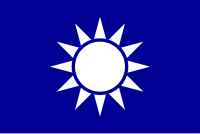Kuomintang
Republic of China political party
Kuomintang (KMT; Chinese: 中國國民黨; English: Chinese Nationalist Party), also known as Guomindang (GMD), is the main political party in Republic of China (Taiwan). It was ruling in Mainland China until 1949 when Communists captured the mainland and the KMT moved to Taiwan. It was founded by Song Jiaoren and Sun Yat-sen. Chiang Kai-shek later led the party for decades.
 | |
| Abbreviation | KMT |
| Chairman | Johnny Chiang Chi-chen |
| Secretary-General | Lee Chien-lung |
| Founded | 10 October 1919 |
| Preceded by |
|
| Headquarters | 232–234 Sec 2 Bade Rd, Zhongshan District, Taipei, ROC 10492[1] |
| Newspaper |
|
| Think tank | National Policy Foundation |
| Youth wing | Kuomintang Youth League |
| Education Wing | Institute of Revolutionary Practice |
| Armed wing | National Revolutionary Army (1925–1947) Taiwan Garrison Command (1958–1992) |
| Membership (2020) | 345,971[2] |
| Ideology | |
| Political position | Centre-right[9][10][11] to right-wing[12][13] |
| National affiliation | Pan-Blue Coalition |
| Regional affiliation | Asia Pacific Democrat Union |
| International affiliation | |
| Colours | Blue |
| Anthem | Sān Mín Zhǔyì |
| Legislative Yuan | 38 / 113 |
| Municipal mayors | 3 / 6 |
| Magistrates/mayors | 12 / 16 |
| Councillors | 394 / 912 |
| Township/city mayors | 83 / 204 |
| Party flag | |
 | |
| Website | |
| www | |
| Kuomintang | |||||||||||||||||||||||||||||||||||||||||
 "Kuomintang (Guómíndǎng)" in Traditional (top) and Simplified (bottom) Chinese characters | |||||||||||||||||||||||||||||||||||||||||
| Chinese name | |||||||||||||||||||||||||||||||||||||||||
|---|---|---|---|---|---|---|---|---|---|---|---|---|---|---|---|---|---|---|---|---|---|---|---|---|---|---|---|---|---|---|---|---|---|---|---|---|---|---|---|---|---|
| Traditional Chinese | 中國國民黨 | ||||||||||||||||||||||||||||||||||||||||
| Simplified Chinese | 中国国民党 | ||||||||||||||||||||||||||||||||||||||||
| Literal meaning | "Nationals’ Party of China" | ||||||||||||||||||||||||||||||||||||||||
| |||||||||||||||||||||||||||||||||||||||||
| Abbreviated to | |||||||||||||||||||||||||||||||||||||||||
| Traditional Chinese | 國民黨 | ||||||||||||||||||||||||||||||||||||||||
| Simplified Chinese | 国民党 | ||||||||||||||||||||||||||||||||||||||||
| |||||||||||||||||||||||||||||||||||||||||
| Tibetan name | |||||||||||||||||||||||||||||||||||||||||
| Tibetan | ཀྲུང་གོའི་གོ་མིན་ཏང | ||||||||||||||||||||||||||||||||||||||||
| |||||||||||||||||||||||||||||||||||||||||
| Zhuang name | |||||||||||||||||||||||||||||||||||||||||
| Zhuang | Cunghgoz Gozminzdangj | ||||||||||||||||||||||||||||||||||||||||
| Mongolian name | |||||||||||||||||||||||||||||||||||||||||
| Mongolian Cyrillic | Дундадын (Хятадын) Гоминдан (Хувьсгалт Нам) | ||||||||||||||||||||||||||||||||||||||||
| Mongolian script | ᠳᠤᠮᠳᠠᠳᠤ ᠶᠢᠨ (ᠬᠢᠲᠠᠳ ᠤᠨ) ᠭᠣᠮᠢᠨᠳᠠᠩ (ᠬᠤᠪᠢᠰᠬᠠᠯᠲᠤ ᠨᠠᠮ) | ||||||||||||||||||||||||||||||||||||||||
| |||||||||||||||||||||||||||||||||||||||||
| Uyghur name | |||||||||||||||||||||||||||||||||||||||||
| Uyghur | جۇڭگو گومىنداڭ | ||||||||||||||||||||||||||||||||||||||||
| |||||||||||||||||||||||||||||||||||||||||
| Manchu name | |||||||||||||||||||||||||||||||||||||||||
| Manchu script | ᠵᡠᠩᡬᠣ ᡳ ᡬᠣᠮᡳᠨᡩᠠᠩ | ||||||||||||||||||||||||||||||||||||||||
| Romanization | Jungg'o-i G'omindang | ||||||||||||||||||||||||||||||||||||||||

References change
- ↑ "Kuomintang Official Website". Kuomintang. Archived from the original on 3 July 2015. Retrieved 13 September 2011.
- ↑ "江啟臣壓倒性勝出 成最年輕國民黨主席 - 中央社CNA". Archived from the original on 7 March 2020. Retrieved 2020-03-07.
- ↑ 政策綱領. Kmt.org.tw. Archived from the original on 13 May 2019. Retrieved 19 June 2016.
- ↑ The Editors of Encyclopædia Britannica. "Three Principles of the People". Encyclopædia Britannica. Archived from the original on 26 October 2016. Retrieved 10 October 2016.
- ↑ Mary C. Wright (1955). From Revolution to Restoration: The Transformation of Kuomintang Ideology. Association for Asian Studies. pp. 515–532.
- ↑ "Taiwan's 'born independent' millennials are becoming Xi Jinping's lost generation". The Washington Post. 26 December 2019. Archived from the original on 27 March 2020. Retrieved 23 February 2020.
- ↑ Jonathan Fenby (2005). Chiang Kai Shek: China's Generalissimo and the Nation He Lost. Carroll & Graf Publishers. p. 504. ISBN 978-0-7867-1484-1. Archived from the original on 5 February 2017. Retrieved 28 June 2010.
- ↑ Hans Kohn, Nationalism: Its Meaning and History (1955) p. 87.
- ↑ "New face for KMT in Taiwan". The Australian.
The problems for the centre-right KMT in retaining the presidency over the centre-left DPP…
- ↑ Qi, Dongtao (11 November 2013). "Globalization, Social Justice Issues, Political and Economic Nationalism in Taiwan: An Explanation of the Limited Resurgence of the DPP during 2008–2012". The China Quarterly. 216: 1018–1044. doi:10.1017/S0305741013001124. S2CID 154336295.
Furthermore, the studies also suggest that the DPP, as a centre-left party opposed to the centre-right KMT, has been the leading force in addressing Taiwan's various social justice issues.
- ↑ Shim, Jaemin (2018). "Mind the Gap! Comparing Gender Politics in Japan and Taiwan". GIGA Focus|Asia (5). German Institute of Global and Area Studies. Archived from the original on 26 December 2019. Retrieved 26 December 2019.
- ↑ Rigger, Shelley (2016). "Kuomintang Agonistes: Party Politics in the Wake of Taiwan's 2016 Elections". Orbis. 60 (4): 408–503. doi:10.1016/j.orbis.2016.08.005. Retrieved May 27, 2020.
Instead of reshaping its priorities to fit the expectations of a changing society, the KMT (at least for the moment) seems to be doubling down on its self-marginalizing approach. The new party chair is Hung Hsiu-chu, the erstwhile presidential candidate whose far-right views made it necessary to replace her.
- ↑ "Taiwan Lawmakers Push 'Marriage Equality' Bill". Inter Press Service. 30 October 2013. Archived from the original on 12 April 2020. Retrieved 12 April 2020.
The current push follows two previous efforts by DPP lawmakers in 2003 and 2006 to introduce same-sex marriage bills that were blocked from the legislative agenda by the right-wing Chinese Nationalist Party (Kuomintang or KMT) majority.